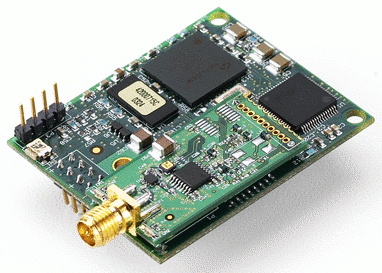Modules simplify embedding Wi-Fi in devices
Mar 17, 2004 — by LinuxDevices Staff — from the LinuxDevices Archive — 9 views Digi International has unveiled a pair of modules intended to ease the task of adding Wi-Fi (802.11b) wireless networking to a wide range of embedded systems and devices, including those based on Linux. The company says its Digi Connect Wi-ME (shown at left) and Digi Connect Wi-EM (shown below) modules are well suited to applications in… access control, retail point-of-sale, RFID readers, medical devices, and industrial automation.
Digi International has unveiled a pair of modules intended to ease the task of adding Wi-Fi (802.11b) wireless networking to a wide range of embedded systems and devices, including those based on Linux. The company says its Digi Connect Wi-ME (shown at left) and Digi Connect Wi-EM (shown below) modules are well suited to applications in… access control, retail point-of-sale, RFID readers, medical devices, and industrial automation.
(Click here for a larger view of the Wi-ME module)
The modules reduce the complexity of adding Wi-Fi communications to an embedded system or device, by providing a simple, easy-to-interface digital interface, similar to that of an ordinary serial port. Each module contains a 32-bit RISC processor and 8MB RAM memory, along with 2MB of nonvolatile Flash memory containing firmware that handles all Wi-Fi control and communications functions including security features such as WEP/WPA encryption.

Digi's Wi-EM module
Digi says the modules will also include FCC approval, thereby alleviating the time, cost, and risk of obtaining product certifications.
Digi also manufactures modules that implement wired Ethernet rather than wireless Wi-Fi networking — that are pin- and software-compatible with the Wi-EM and Wi-ME — making it easy to design devices that implement a choice of wired or wireless networking technology.
Limited quantities of the Wi-EM and Wi-ME Wi-Fi modules are expected to be available in April, with initial production quantities available in June.
This article was originally published on LinuxDevices.com and has been donated to the open source community by QuinStreet Inc. Please visit LinuxToday.com for up-to-date news and articles about Linux and open source.